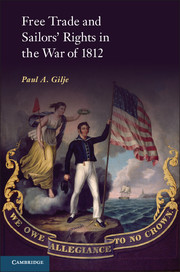Part Five - Memory
Published online by Cambridge University Press: 05 March 2013
Summary
Memory
Republicans began to mold the memory of the War of 1812 as soon as the conflict ended. Regardless of all of the difficulties the United States had confronted in the war – the often pathetic performance of the military, the political paralysis that contributed to one disaster after another, and a peace treaty that settled none of the reputed causes of the war – by simply declaring victory, Americans were able to win the peace. Federalists were outraged by this approach and correctly pointed out that the Treaty of Ghent ignored Porter's motto.
Republicans, however, did not abandon either free trade or sailors’ rights in their diplomacy after the War of 1812. Americans could not and would not forget the issue of impressment, even if without a major European war opposition to impressment was more a matter of abstract principle than opposition to an ongoing practice. Diplomats repeatedly brought the question before the British and decried even the hint of a return to the hated policy. The British navy, for its part, generally behaved itself and avoided this irritant to Anglo-American relations. However, Great Britain was as obstinate as the United States in refusing to concede officially its right to search neutral vessels for seamen. In the meantime, Americans sought to protect deserters from the British military in the Great Lakes region in a series of confrontations that asserted the territorial integrity of the United States. Americans may have established the sanctity of their borders as a refuge for British deserters, but on the high seas the flag did not provide absolute protection for the crews on their ships. The controversy over impressment lingered in the background of Anglo-American diplomacy, surfacing in the 1820s and even into the 1830s. However, by that time, and certainly by the 1840s, while never definitively settled, the issue of impressment became less important for both sides.
- Type
- Chapter
- Information
- Free Trade and Sailors' Rights in the War of 1812 , pp. 277 - 278Publisher: Cambridge University PressPrint publication year: 2013



